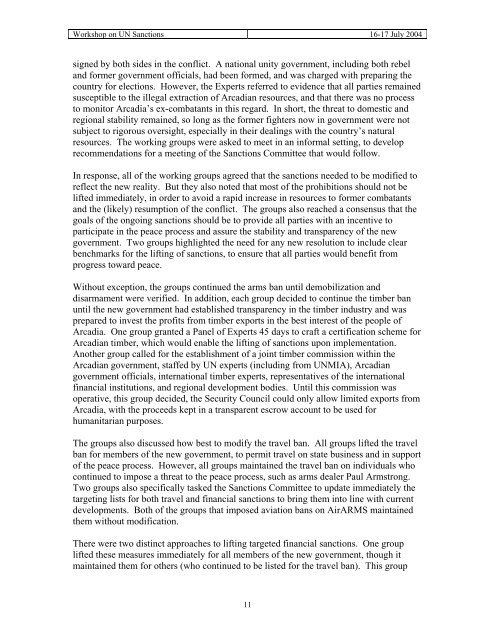UN Sanctions Reform - The Watson Institute for International Studies
UN Sanctions Reform - The Watson Institute for International Studies
UN Sanctions Reform - The Watson Institute for International Studies
You also want an ePaper? Increase the reach of your titles
YUMPU automatically turns print PDFs into web optimized ePapers that Google loves.
Workshop on <strong>UN</strong> <strong>Sanctions</strong> 16-17 July 2004<br />
signed by both sides in the conflict. A national unity government, including both rebel<br />
and <strong>for</strong>mer government officials, had been <strong>for</strong>med, and was charged with preparing the<br />
country <strong>for</strong> elections. However, the Experts referred to evidence that all parties remained<br />
susceptible to the illegal extraction of Arcadian resources, and that there was no process<br />
to monitor Arcadia’s ex-combatants in this regard. In short, the threat to domestic and<br />
regional stability remained, so long as the <strong>for</strong>mer fighters now in government were not<br />
subject to rigorous oversight, especially in their dealings with the country’s natural<br />
resources. <strong>The</strong> working groups were asked to meet in an in<strong>for</strong>mal setting, to develop<br />
recommendations <strong>for</strong> a meeting of the <strong>Sanctions</strong> Committee that would follow.<br />
In response, all of the working groups agreed that the sanctions needed to be modified to<br />
reflect the new reality. But they also noted that most of the prohibitions should not be<br />
lifted immediately, in order to avoid a rapid increase in resources to <strong>for</strong>mer combatants<br />
and the (likely) resumption of the conflict. <strong>The</strong> groups also reached a consensus that the<br />
goals of the ongoing sanctions should be to provide all parties with an incentive to<br />
participate in the peace process and assure the stability and transparency of the new<br />
government. Two groups highlighted the need <strong>for</strong> any new resolution to include clear<br />
benchmarks <strong>for</strong> the lifting of sanctions, to ensure that all parties would benefit from<br />
progress toward peace.<br />
Without exception, the groups continued the arms ban until demobilization and<br />
disarmament were verified. In addition, each group decided to continue the timber ban<br />
until the new government had established transparency in the timber industry and was<br />
prepared to invest the profits from timber exports in the best interest of the people of<br />
Arcadia. One group granted a Panel of Experts 45 days to craft a certification scheme <strong>for</strong><br />
Arcadian timber, which would enable the lifting of sanctions upon implementation.<br />
Another group called <strong>for</strong> the establishment of a joint timber commission within the<br />
Arcadian government, staffed by <strong>UN</strong> experts (including from <strong>UN</strong>MIA), Arcadian<br />
government officials, international timber experts, representatives of the international<br />
financial institutions, and regional development bodies. Until this commission was<br />
operative, this group decided, the Security Council could only allow limited exports from<br />
Arcadia, with the proceeds kept in a transparent escrow account to be used <strong>for</strong><br />
humanitarian purposes.<br />
<strong>The</strong> groups also discussed how best to modify the travel ban. All groups lifted the travel<br />
ban <strong>for</strong> members of the new government, to permit travel on state business and in support<br />
of the peace process. However, all groups maintained the travel ban on individuals who<br />
continued to impose a threat to the peace process, such as arms dealer Paul Armstrong.<br />
Two groups also specifically tasked the <strong>Sanctions</strong> Committee to update immediately the<br />
targeting lists <strong>for</strong> both travel and financial sanctions to bring them into line with current<br />
developments. Both of the groups that imposed aviation bans on AirARMS maintained<br />
them without modification.<br />
<strong>The</strong>re were two distinct approaches to lifting targeted financial sanctions. One group<br />
lifted these measures immediately <strong>for</strong> all members of the new government, though it<br />
maintained them <strong>for</strong> others (who continued to be listed <strong>for</strong> the travel ban). This group<br />
11
















